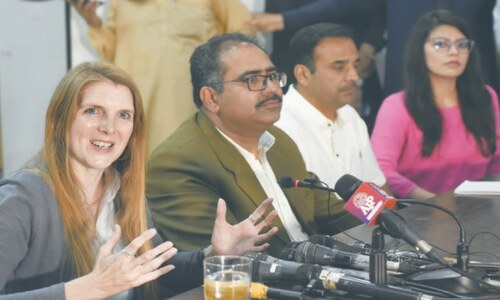ISLAMABAD: In the year 2015, 4,426 million sugar sweetened beverages (SSBs) were consumed in Pakistan costing Rs387 billion but the industry paid only Rs38 billion in taxes.
As many as 2,200 deaths are reported daily due to non-communicable diseases (NCDs) in Pakistan and the estimates of indirect cost of overweight and obesity is 1.9pc of the gross domestic product GDP. The total direct and indirect cost of overweight and obesity is estimated to be R428 billion.
These figures were shared with participants of a workshop on “Loss of sugar sweetened beverages (SSB) and importance of taxation” organised by Pakistan National Heart Association (Panah).
Pakistan has the fourth highest burden of type 2 diabetes worldwide with more than 19 million cases. At least, a 20pc tax should be imposed on sugar sweetened beverages to increase revenue with the elimination of diseases.Panah General Secretary Sanaullah Ghumman said the finance bill 2021-22 was almost finalised.
“It is high time to help government functionaries like FBR, Ministry of Finance and political leadership identify policies which may be very useful to reduce miseries of the people and provide double advantage to the government. High consumption of sugar sweetened beverages is one of the major causes of obesity and related NCDs like heart disease, hypertension, diabetes, liver and kidney diseases, some types of cancers and tooth decay,” he said.
As per WHO, 58pc of total deaths were contributed by NCDs in Pakistan.
“In other words, approximately 2,200 people die every day due to these deadly diseases in Pakistan. According to NCDs steps survey of Pakistan (2014-15), more than four out of 10 adults (41.3pc) are obese or overweight while 37pc have hypertension. Similarly, every fourth adult (26pc) was suffering from type 2 diabetes as per second National Diabetes Survey of Pakistan conducted in 2016-17,” he said.
To reduce health care costs and NCDs, it is important to discourage the consumption of these SSBs. Raising taxes on SSBs is an evidence-based first step to reduce obesity and disease burden of related NCDs, and increase revenue for the country.
He said WHO and World Bank had recommend tax increase on SSBs by at least 20pc as a part of a strategy to reduce obesity and related NCDs.
National Coordinator Nutrition, Ministry of Health, Dr Khawaja Masood Ahmed said though the beverage industry claims paying Rs70 billion tax as per FBR’s yearbook 2019- 20 the total sales tax and FED by the beverage industry was estimated to be less than Rs38 billion.
Meanwhile, Panah and a number of other organisations have appealed to the prime minister and the finance minister to increase the federal excise duty (FED) on SSBs by 20pc.
“Increasing the tax on SSBs is an important first step to discourage consumption and increase revenue for the country. Pakistan has applied low taxes on SSBs (13pc FED and 17pc GST) compared to India (40pc levy) and Maldives ($2.18). Other countries like Saudi Arabia, UAE and Qatar have imposed a 50pc tax on SSBs and a 100pc tax on energy drinks,” they said.
Published in Dawn, June 6th, 2021














































Dear visitor, the comments section is undergoing an overhaul and will return soon.